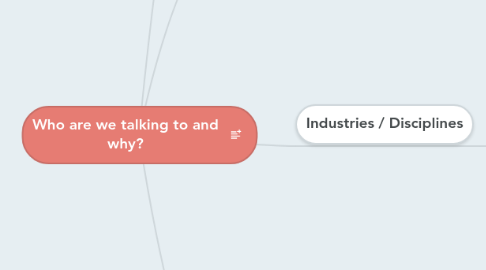
1. topics
1.1. concerns:
1.1.1. what issues/function are important to them
1.2. LI-LA:
1.2.1. what aspect of lab informatics (LI) / automation (LA) should they know about
1.3. Why?
1.3.1. ...is LI-LA important to them
2. Industrial / Gov. / Private Res.
2.1. Senior Management
2.1.1. concerns: meeting long-term goals, budget control, effective use of resources, coordination with other groups/organizations
2.1.2. LI-LA: needs to have sufficient understanding of lab tools to make informed decisions about product purchases, implementation plans, strategic plans including: knowledge mgt / integration, data security, data mining, system coordination/integration, collaboration, data quality, Big Data / analytics.
2.1.3. Why? Laboratories exist to produce knowledge / information / data - management is responsible for ensuring that those elements are well managed.
2.2. Lab Managers
2.2.1. concerns: meeting lab goals, productivity, budget, personnel management, education, ensuring appropriate tools & support, meet regulatory requirements
2.2.2. LI-LA: capabilities of relevant technologies, make appropriate choices to meet short- and long-term goals, qualify personnel, knowledge/information/data mgt., ensure data quality & integrity
2.2.3. Why? Lab operations are supported by technologies that are overwhelmingly digital. The effectiveness of those operations can be improved or hindered by the types of products used, whether they are used in isolation or an integrated environment. Part of this is dependent upon the flexibility needed (research being more flexible than quality control) and how product implementation strategies play into it.
2.3. Lab Personnel
2.3.1. concerns: meeting individual goals, quality of work, being prepared/qualified to carry out work assignments
2.3.2. LI-LA: understand tools, be competent users and/or systems managers, recognize failures, troubleshooting, provide input into planning process,
2.3.3. Why? In the pre-digital era, lab personnel were in complete control of how work was conducted. Now much of their work is handled by programmed systems. Unless they fully understand what is happening in the course of their work, the quality of the data can be compromised by system failures or improper application of tools and settings.
2.4. Lab Support
2.4.1. Technology Planning
2.4.1.1. concerns: advising labs on the technologies that would be of value to them, coordinate planning, avoid conflicts, be forward looking to the advantages / disadvantages of different implementation paths, provide coordination where appropriate between groups, may provide project management support, guide product implementation, understand the appropriate regulatory requirements
2.4.1.2. LI-LA: thorough understanding of lab technologies and capabilities, able to look for opportunities for cooperation / synergism between implementations
2.4.1.3. Why? The range of technologies covered by lab systems is extremely wide, and requires a systems/process engineering mindset to plan, design, and implement and increasingly complex set of systems. An understanding of the application environment, the technologies, and the underlying products is needed. The potential for cooperation between labs makes comprehensive planning essential, and interesting.
2.4.2. LAB-IT
2.4.2.1. concerns: lab specific application / technology / lab-unique system support, coordinates with Corporate IT for infrastructure issues and generic corporate functions (office applications, network access, etc.)
2.4.2.2. LI-LA: understand the functions of lab products, support programs (including vendors role), diagnose problems and recommend appropriate fixes,
2.4.2.3. Why? Unlike generic office applications, lab system are not part of a typical IT experience. Diagnosing problems requires the ability to figure out the contributing factors (which can include wiring and the behavior of external systems) and correct problems. An understanding of the users environment is essential.
2.4.3. Corporate IT
2.4.3.1. concerns: information / network infrastructure, generic applications, hardware, non-lab specific applications and systems
2.4.3.2. LI-LA: provide support to LAB-IT as appropriate
2.4.3.3. Why? The products used in lab work come from a variety of sources; their operation may be OS version dependent and not upgraded regularly. Standard IT policies may need some flexibility to keep systems running. Down-time on lab systems can cripple lab work and have a cascading effect on other operations (for example, QC and manufacturing), so keeping things running is essential.
3. Industries / Disciplines
3.1. any / all - differentiating this from industry, technology specific groups; key point is cross-communications, learning from different industries and re-applying solutions rather then re-inventing them
3.1.1. R&D
3.1.2. testing (analytical, physical, QC, etc.
3.1.3. contract services
3.2. size (with gradations and corresponding considerations in between)
3.2.1. small
3.2.1.1. concerns: may be too focused on immediate objectives to pay attention to longer-term issues; not be aware of, concerned with, implications of technology choices, may not be able to afford or appreciate need for technology management issues
3.2.2. large
3.2.2.1. concerns: multi-campus, multi-national considerations, needs hierarchical technology management
4. Academic
4.1. Instructors
4.1.1. concerns: preparing students for academic research, teaching, industrial careers, including science and laboratory tools
4.1.2. LI-LA: understand the functions and capabilities of lab technologies and how/when they are used. Guide students as to what they should know to be competent users.
4.1.3. Why? while instructors, particularly at the undergraduate level, may focus on the basics of the science, however, the way lab work is done is increasingly dependent on instrumentation which in turn is managed by digital systems (either internal to the instrument or as an add-on).
4.2. students - undergraduate, graduate, doctoral, post-doc
4.2.1. concerns: achieving competence in a scientific discipline including the ability to understand and effectively use the tools of modern laboratory work
4.2.2. LI-LA: become competent users of lab technologies, understand what tools to apply in different applications, and how to get more information about them
4.2.3. Why? while understanding science is essential, they need to understand the tools of modern science and their use to gain employment and be fully competent scientists
